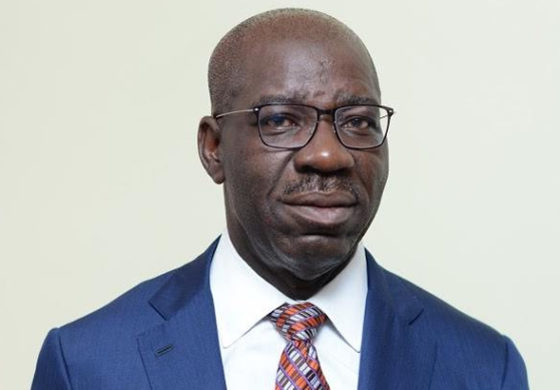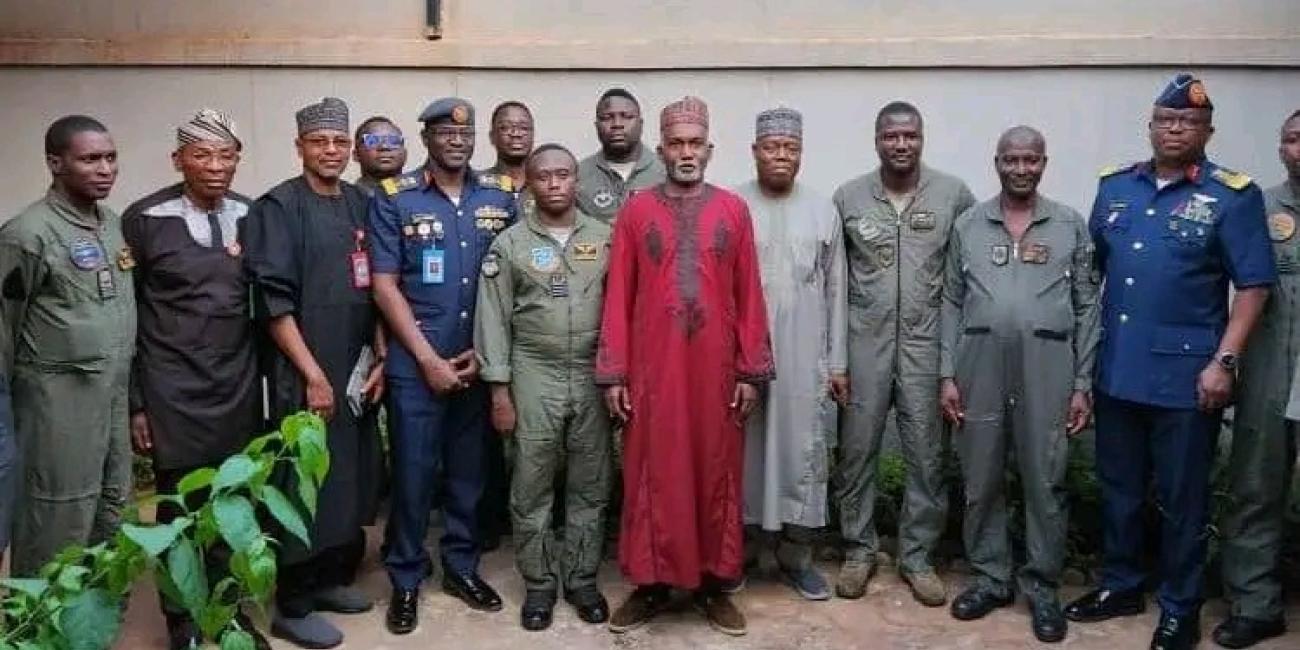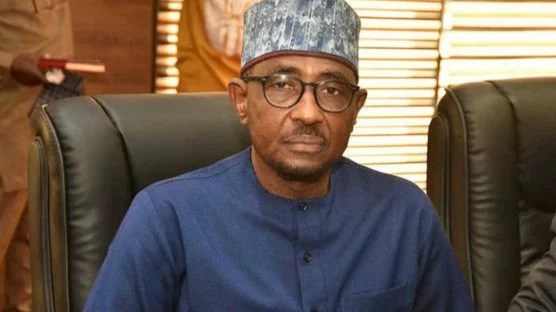Headlines
Edo 2020: Obaseki, Seven APC Govs Seek Audience with Buhari after Meeting Tinubu

Eight governors elected on the platform of the All Progressives Congress, on Sunday, held a meeting with the National Leader of the APC, Asiwaju Ahmed Tinubu, at the state House Marina, Lagos to make a case for the Edo State Governor, Godwin Obaseki.
Although details of the meeting were still sketchy as of the time of filing this report, it was gathered that the governors were at the closed-door meeting to seek Tinubu’s intervention in the search for truce in the political conflict between Obaseki and his godfather, the National Chairman of the APC, Adams Oshiomhole.
Governors who attended the meeting included the chairman of the Progressives Governors Forum, Abubakar Bagudu (Kebbi), Abdullahi Ganduje (Kano), Babajide Sanwu-Olu (Lagos), Rotimi Akeredolu (Ondo), Adeboyega Oyetola (Osun) and Dapo Abiodun (Ogun).
Others are Mohammed Abubakar (Jigawa) and Obaseki.
Five of the governors, including Obaseki, then proceeded to Abuja, preparatory to a meeting with the President, Major General Muhammadu Buhari (retd.).
A source privy to the meeting who pleaded anonymity because he was not authorized to speak to the media, said, “The governors met with our national leader, they laid their cards on the table and plainly asked for his intervention.
“They admitted that mistakes had been made especially with the governor’s refusal to pave the way for the swearing in of 14 elected APC members as members of the state Assembly.
“They also noted that the meeting ought to have held earlier and that the governor who was present at the meeting should have reached out to seek help much earlier before the situation degenerated to the level of a public spat between the governor and the national chairman.
“And being the kind of person, he is, our leader listened patiently and he is not one to rush into judgment before hearing from the other party. He will look at what is in the party’s best interest after consulting widely with other stakeholders before taking a final stand.”
The National Working Committee of the party had approved the direct primary as the mode of selecting the party’s standard bearer for the forthcoming governorship election in the state.
Loyalists of the governor are opposed to the mode arguing that it was meant to frustrate his chances of standing as the party’s standard bearer.
Obaseki and his estranged political godfather have been at odds over the former’s bid for a second term in office following a long-drawn battle for the political control of the state.
Pundits accuse the governor of working with his fellow governors opposed to Oshiomhole leadership style in an earlier attempt to force Oshiomhole out of office.
A member of the party’s National Working Committee who also pleaded anonymity for fear of retribution said, “Besides the feud between Obaseki and our National Chairman, we have to consider the overall interest of our party. The best thing to do for our party in Edo is to have direct primaries. This is why; it is the best for us even without the conflict between the two leaders. The last time we did primaries even for the election of Obaseki as governor, it was direct, we have done that there before, we can only improve on it than to go and try something new. Two, if we are learning from our past mishaps like what happened in Rivers State, there were litigations over the congresses we did before and we went into indirect and we used officials whose positions were being challenged in court as delegates and when the court nullified the congresses that brought the executives, everything done was nullified, we lost the opportunity to contest the elections in Rivers State.
“There are two chairmen in Edo, we have recognized the removal of the Anselem-led exco and the matter is still in court, whichever way the court rules, we may have a problem if we use the indirect using the executives as delegates.
“Then there is the issue of COVID-19 with the protocol of social distancing. It will be easier to manage a crowd in each ward instead of bringing four to five thousand people in one place as the indirect mode will require.”
When contacted, the APC National Vice-Chairman, South South, Hilliard Eta said, “As the governing political party, the APC will continue to lead by example when it comes to giving party members the right to choose candidates.
Also, the National Publicity Secretary of the party, Mallam Lanre Issa-Onilu, said, “The APC will, as always, provide a level playing field for all aspirants to pursue their legitimate aspirations in line with the constitution on our party guidelines.”
The Punch
Headlines
Free at Last: Burkina Faso Releases 11 Nigerian Soldiers

Burkina Faso has released Nigerian soldiers who were detained after their aircraft made a forced landing in the Sahelian country earlier this month, Nigerian officials said.
In a statement, Alkasim Abdulkadir, Tuggar’s spokesperson, said both sides resolved the matter amicably and secured the release of the Nigerian Air Force pilots and crew.
The soldiers had been held for nearly two weeks after the Confederation of Sahel States (AES) described the aircraft’s landing as an “unfriendly act” carried out in defiance of international law.
The Nigerian Air Force, however, said the crew encountered a technical issue that required a precautionary landing in Bobo-Dioulasso, the nearest available airfield. It said the landing complied with standard safety procedures and international aviation protocols.
Headlines
Corruption Allegations: NMDPRA Boss Farouk Ahmed Meets Tinubu, Resigns

The Chief Executive Officer (CEO) of the Nigerian Midstream and Downstream Petroleum Regulatory Authority (NMDPRA), Farouk Ahmed, has resigned following a meeting with President Bola Tinubu amid corruption allegations.
Tinubu, on Wednesday, summoned Ahmed to the Presidential Villa in Abuja, following allegations of economic sabotage and corruption.
Also caught in the web of resignation was the CEO of the Nigeria Upstream Petroleum Regulatory Commission (NUPRC), Gbenga Komolafe, according to a statement on Wednesday by Bayo Onanuga, special adviser to the president on information and strategy.
Tinubu was said to have nominated successors to the senate for approval.
“Tinubu has asked the Senate to approve the nominations of two new chief executives for the Nigerian Midstream and Downstream Petroleum Regulatory Authority (NMDPRA) and the Nigerian Upstream Petroleum Regulatory Commission (NUPRC),” the statement reads.
“The requests followed the resignation of Engineer Farouk Ahmed of the NMDPRA and Gbenga Komolafe of the NUPRC.
“Both officials were appointed in 2021 by former President Buhari to lead the two regulatory agencies created by the Petroleum Industry Act (PIA).
“To fill these positions, President Tinubu has written to the Senate, requesting expedited confirmation of Oritsemeyiwa Amanorisewo Eyesan as CEO of NUPRC and Engineer Saidu Aliyu Mohammed as CEO of NMDPRA.”
Onanuga said the two nominees are seasoned professionals in the oil and gas industry.
Headlines
I’m Ready for Probe, NMDPRA Boss Farouk Ahmed Responds to Dangote’s Corruption Allegation

The Chief Executive Officer of the Nigerian Midstream and Downstream Petroleum Regulatory Authority (NMDPRA), Engr. Farouk Ahmed, has responded to recent claims regarding the financing of his children’s education and his integrity in office, insisting that the allegations are misleading and ill-timed.
Ahmed said the allegations “necessitated this response, not because I fear scrutiny of my finances, which I welcome, but because the timing and nature of these claims demand context that only three decades of public service can provide.”
Ahmed highlighted his career in Nigeria’s petroleum sector, which began in 1991, noting that he rose through merit rather than political patronage.
He recalled his experience across technical divisions, crude oil marketing, gas supply monitoring, and downstream operations, stressing that his decisions have always been guided by Nigeria’s national interest.
“I spent my formative years in the technical divisions, where decisions are measured not by political expediency but by engineering precision and market realities,” he said.
He further outlined his rise to General Manager of the Crude Oil Marketing Division in 2012 and later Deputy Director in 2015, before being appointed NMDPRA Chief Executive in 2021.
On assuming the role, Ahmed said, he understood the challenges of implementing reforms under the Petroleum Industry Act, acknowledging that enforcing transparency in a sector long characterised by opacity would inevitably meet resistance.
Addressing the allegations about his children’s education, Ahmed said the claim that he spent $5 million on their Swiss schooling was misleading. “Three of my four children received substantial merit-based scholarships ranging from 40% to 65% of tuition costs, verifiable information are available to any authorised investigation,” he said, adding that contributions from his late father, a Northern Nigerian businessman, further supported the education costs.
He added: “When scholarships, family contributions, and my own savings accumulated over three decades are properly accounted for, my personal financial obligation was entirely consistent with someone of my professional standing and length of service.”
Ahmed confirmed that his annual compensation of approximately N48 million, including allowances, is publicly documented, and that he has submitted detailed asset declarations to the Code of Conduct Bureau throughout his career.
The CEO also linked the timing of the allegations to recent regulatory actions taken by NMDPRA.
“These allegations resurface precisely when NMDPRA has enforced quality standards revealing substandard petroleum products in the market, implemented stricter licensing requirements, and insisted on transparent pricing mechanisms that eliminate opacity benefiting certain market players. This timing is not coincidental,” Ahmed said.
He defended the authority’s import licensing decisions, emphasizing that they comply with Section 7 of the Petroleum Industry Act, which mandates supply security and prevention of scarcity.
“Granting import licenses when domestic supply proves insufficient is not sabotage, it is our legal duty,” he said.
Ahmed invited formal investigations into his finances and tenure, stating: “I formally and publicly request the Code of Conduct Bureau to conduct comprehensive review of all my asset declarations since 1991, the Economic and Financial Crimes Commission to examine all my financial transactions and sources of income, and the National Assembly to exercise its oversight function regarding any allegations of regulatory compromise during my tenure. I will cooperate fully, provide all documentation, and answer all questions under oath if required.”
Concluding, Ahmed reaffirmed his commitment to regulatory independence and transparency.
“Three decades of service to Nigeria’s petroleum sector have taught me that integrity is tested not in comfortable moments but when powerful interests demand compromise. My response is simple: investigate thoroughly, examine every claim, scrutinize every transaction. My record both financial and professional will withstand any legitimate inquiry.”






